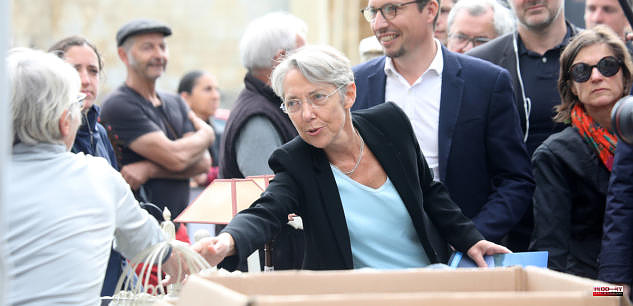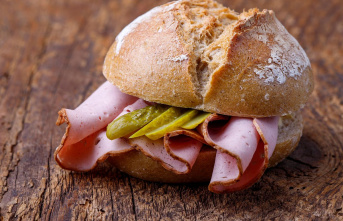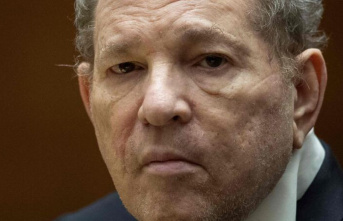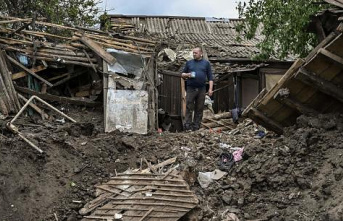Three weeks before the first round legislative elections, on June 12, the Elysee indicated that candidate ministers would have to resign if elected in their constituency. This unwritten rule, which has been in effect since 2007, was also defended by Emmanuel Macron in 2017. Olivia Gregoire (government spokesperson) also reminded it Monday, May 23, saying: "If some people never receive the confidence of the people, then they will have to learn from the lesson and step down as government. This rule applies to Elisabeth Borne (candidate in Calvados), who has not yet been elected through universal suffrage.
Only six ministers from Edouard Philippe’s first government were eligible to run for the 2017 legislative elections. They are now 15, which includes the Prime Minister. This rule puts a lot of the new government under severe pressure, even some heavyweights. The Obs has created a three-tiered scale to assess the likelihood of ministers being elected, based on the historical context of the constituency, their presence and opposition, and the results of the presidential and legislative elections.
Gerald Darmanin should consider the legislative a matter of course, and he was reelected in Beauvau. In 2012, he was elected to the UMP label in the constituency that includes Tourcoing. He was also the first deputy mayor of Tourcoing. He was elected regional councilor for Hauts-de-France 2016 and had been replaced by Vincent Ledoux in 2017. This deputy is still a deputy following his re-election 2017 with 55.9% against LREM. Emmanuel Macron won the presidential election with 28.9% of votes, beating Marine Le Pen's 26.2%. He was then defeated by 13 points in round 2. Gerald Darmanin will be against a candidate of the National Rally and a representative from the New Popular Ecological and Social Union Nupes in a constituency in which Jean-Luc Melenchon has done better than his national score with 24.7% votes. The party Les Republicains (LR), has decided to support the Minister for the Interior, and will not present a candidate.
Gabriel Attal should not have to participate in the legislative elections. He is a conqueror. The former government spokesman, who won the 2017 constituency of Issy-les-Moulineaux, and Vanves with 60.9%, defeated the UDI candidate, named successor to Andre Santini (established since 1988). Emmanuel Macron was 14 points ahead Jean-Luc Melenchon (24.1%) in the presidential election. He won 38.7%.
The first election was without major risk for the head government. His constituency voted for Emmanuel Macron in the first round, while Marine Le Pen voted for 26.8%. This was 14 points less than the result of the second round. Alain Tourret, the LREM deputy, had won a large part of the 2017 election (68.3%). Jean-Philippe Roy is the latest investment by the far-right party which has now become the RN. Noe Gauchard was 22 years old when the Nupes invested in him.
Her notoriety and new position could work in her favor. Elisabeth Borne, however, could be hurt by her parachuting in the constituency with which she has no family ties. She is from Livarot, where her maternal grandfather was mayor.
Olivia Gregoire was surprised to snatch the seat of deputy from Philippe Goujon, the local baron. She was elected UMP then LR in 2007 and mayor of 15th arrondissement since 2008. Nearly 47% of the votes were hers in the first round. Emmanuel Macron won the presidency with 42.7% of votes in the first round, beating Jean-Luc Melenchon (17.3%). The (small) danger in this area of Parisian beauty could be from the right. Eric Zemmour (Reconquest!) is the one! Valerie Pecresse, (LR), was third (11%), and Valerie Zemmour (Reconquest!) was fourth (10.95%).
His constituency is one of only a few in Loir-et-Cher that voted for Emmanuel Macron (nearly 29%) over Marine Le Pen (23.5%) during the first round. The former mayor of Marchenoir, and ex-regional councilor for Centre-Val de Loire, had won the seat as deputy in 2017, with 69.1% against the candidate of RN, which was again invested. He will also be facing a "rebellious investment by the Nupes in Socialist Land (where Jack Lang was elected between 1986 and 2000).
Yael BraunPivet, the outgoing deputy, had received 47.15% of votes in 2017's first round, before she won with almost 59% against candidate LR on a country yet always on the left. She is a member of civil society and has made her name locally through her association commitments, especially since 2014 at Restos du Coeur. Emmanuel Macron won the first round of presidential elections with 36.8%, compared to Jean-Luc Melenchon's 21.5%. In 2017, 8.2% of the vote went to Sophie Thevenet (a candidate who was invested by Nupes).
Olivier Veran is very familiar with this constituency. In 2012, he was Deputy Genevieve Fioraso. He received 47.2% in the first round of voting in 2017. In 2017, he won 68.1% against the UDI candidate supported LR. His notoriety at the Ministry of Health can also help him. Emmanuel Macron won 33.5% of the votes for the presidential election. Jean-Luc Melenchon was second at 27.3%, which is more than five points higher than his national score. The left could make it to the second round thanks to Yannick Jadot's 9.4% performance. This should tickle the minister.
In 2012, the former socialist was able to win this historic right-leaning constituency. In 2017, he was reelected by defeating LREM (43.33% against 43.7%), but he came first in the first round. He has been a member of Emmanuel Macron's government since then and is now running for the majority. The re-elected president came in slightly ahead (26.2%), ahead Marine Le Pen (25.5%), and Jean-Luc Melenchon (18.5%) in the first round. This constituency is the one in Ardeche that has put Emmanuel Macron in front. However, if Michele Victory, his replacement, is unable to stand (a substitute can't stand against her incumbent even under a different title), then the union of left and one candidate could pose a danger.
Jack Lang was replaced by the former socialist in 2012. He was elected in 2002. The socialist won his seat in 2017. With the support of socialists (60.8% against the FN candidate), he managed to retain his seat in 2017. Because her deputy refused to take part in the election to fill her seat, she had to vote for a partial legislative amendment in 2021. She won this time by a large margin. It was also established locally and won the Desvres cantonal, which is part the constituency. However, nothing is won. Marine Le Pen's score in the first round of the presidential elections was up five points over 2017, when she scored 37.8%. Despite winning eight rounds, Emmanuel Macron is still far behind the RN with 25.7%.
The game appears to be played in advance at first glance. Stanislas Guerini won the 2017 election with a score 45.1% in round one, before he dominated against the UDI candidate (65.5%). He is a former general delegate to LREM and will also enjoy the national fame. Emmanuel Macron won the presidential election with almost 37% of the vote. This was 7 points more than Jean-Luc Melenchon (30.1%). However, be cautious. Yannick Jadot was a good candidate in this constituency (formerly socialist), which is the least bourgeois of the 17th district. Lea Balage El Mariky (Nupes candidate) was elected in the 18th arrondissement and is responsible for the elections in EELV.
2017 saw Pacome Rupin win against Patrick Bloche, the PS deputy mayor of Paris. He had nearly 43% of votes in the first round. Since then, the water has flowed beneath the bridges. Clement Beaune has replaced the outgoing LREM deputy who did not want to stand again.
The landing poses risks in a constituency that has been held for 20 years by socialists and where Jean-Luc Melenchon achieved a breakthrough in round one of the presidential election with 31.3%, against 36.4% to Emmanuel Macron. Their candidate Caroline Mecary (member of parliament for People's Union), could be benefited by the gathering of left-wing party members in Nupes, which was split in 2017.
Franck Riester, who was then called LR, has been the MP for the constituency since 2007. He was largely reelected in 2017 with 68.9% against the far-right candidate. The support of the UDI as well as the absence of a LREM presidential candidate had been a boon for him. The president of the Agir party, however, will face an LR candidate as well as a united left.
Franck Riester, a former mayor of Coulommiers is an established local elected representative but his membership in the presidential majority may be a handicap. Marine Le Pen won the first round with 27.3% of votes, compared to 25.8% for Emmanuel Macron. Jean-Luc Melenchon was next with 20.8%.
Justine Benin was elected under the Divers gauche label in 2017, with 64.26% against the candidate LREM. Her local ties were strong, and she was successively a regional and departmental councillor. She saw her popularity increase along with her parliamentary activities. It could be affected by the strong anti-Macron sentiment reflected in the ballot boxes during this presidential election.
Jean-Luc Melenchon won 53% of the vote in the first round. Marine Le Pen (19%) followed by Emmanuel Macron (15%). The far-right candidate won 69% of votes in the second round. It could win because of its inability to unite the left, which has no less than four candidates, including an LFI or an EELV.
Damien Abad, who was just appointed to the government, sees his position as minister in jeopardy due to two rape allegations against him that Mediapart has revealed and which he denies. He accepted the "Figaro" and relied upon the results of the legislative election.
This could impact his candidacy, even though he was re-elected in 2017. The candidate LREM was elected from the constituency in 2012. He had received 67% of the votes.
These rural lands are making significant progress for the far right, as demonstrated by Marine Le Pen's 27.4% score in the first round presidential election (22.7% for Emmanuel Macron).
Ex-LR candidate Amelie de Montchalin was largely victorious in 2017. She received 61.3% more votes than the UDI candidate. Jerome Guedj (the socialist deputy) won 13.1% of votes. The ex-president, Jerome Guedj, of the Departmental Council was well known locally and he is now wearing the Nupes label. The dynamics of the presidential elections are favorable for him. Jean-Luc Melenchon won the first round with 30.7%, slightly ahead of Emmanuel Macron's 29.9%.












